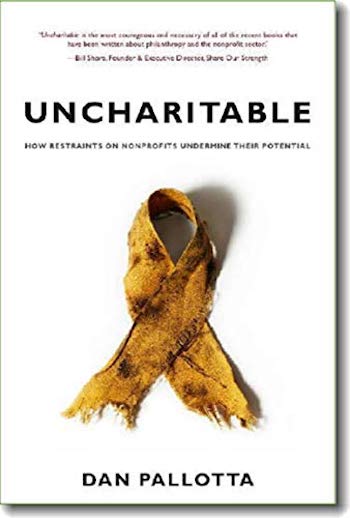Uncharitable: How Restraints on Nonprofits Undermine Their Potential
Dan Pallotta argues that society’s nonprofit ethic acts as a strict regulatory mechanism on the natural economic law.
It creates an economic apartheid that denies the nonprofit sector critical tools and permissions that the for-profit sector is allowed to use without restraint (e.g., no risk-reward incentives, no profit, counterproductive limits on compensation, and moral objections to the use of donated dollars for anything other than program expenditures).
These double-standards place the nonprofit sector at extreme disadvantage to the for profit sector on every level. While the for profit sector is permitted to use all the tools of capitalism to advance the sale of consumer goods, the nonprofit sector is prohibited from using any of them to fight hunger or disease.
Capitalism is blamed for creating the inequities in our society, but charity is prohibited from using the tools of capitalism to rectify them. Ironically, this is all done in the name of charity, but it is a charity whose principal benefit flows to the for-profit sector and one that denies the nonprofit sector the tools and incentives that have built virtually everything of value in society.
The very ethic we have cherished as the hallmark of our compassion is in fact what undermines it.
This irrational system, Pallotta explains, has its roots in 400-year-old Puritan ethics that banished self-interest from the realm of charity.
The ideology is policed today by watchdog agencies and the use of”efficiency” measures, which Pallotta argues are flawed, unjust, and should be abandoned.
By declaring our independence from these obsolete ideas, Pallotta theorises, we can dramatically accelerate progress on the most urgent social issues of our time.
Pallotta has written an important, provocative, timely, and accessible book-a manifesto about equal economic rights for charity. Its greatest contribution may be to awaken society to the fact that they were so unequal in the first place.
Reviews
“Mr Pallotta produces quite a lot of both data and logic. If you do not first analyse a fund-raiser’s results, how is it possible to judge whether what it spent was justified? He also makes a convincing case for charities to spend far more on advertising, perhaps even selling shares to pay for it. If this makes you queasy, read Mr Pallotta’s book. As he says, to mount a campaign to convert 6 billion people to love–which is essentially the role of charity–takes a lot of money…Raise the capital to promote the idea by offering a return on investment, hire the best people to manage the effort, and run the advertising to spread the word. You beat capitalism at its own game.”
The Economist
WATCH: The way we think about charity is dead wrong
Also by Dan Pallotta
- Charity Case by Dan Pallotta
Uncharitable – the movie
You’ve read the book, now watch the movie.
After five years’ effort Dan Pallotta has announced the documentary film version of ‘Uncharitable’.
It will premiere in the USA in March 2023, appear in selected cinemas in April and then be available via streaming.
Find out more about Uncharitable, the movie.
Watch it on demand
You can now watch the movie on demand (from 1 June 2024), in partnership with Fundraising UK Ltd.
It costs $5, with $1 per rental being received by Fundraising UK Ltd.



